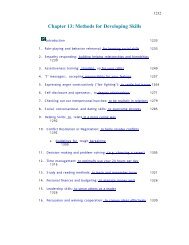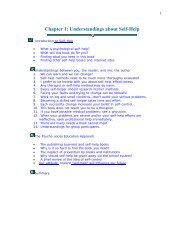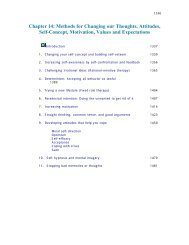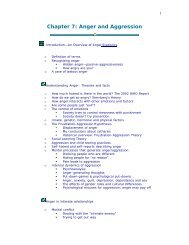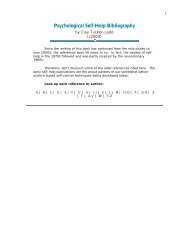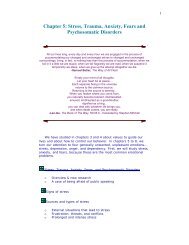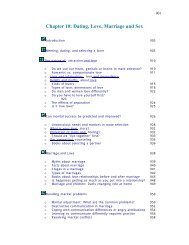Chapter 3: Values and Morals:Guidelines for living - Psychological ...
Chapter 3: Values and Morals:Guidelines for living - Psychological ...
Chapter 3: Values and Morals:Guidelines for living - Psychological ...
You also want an ePaper? Increase the reach of your titles
YUMPU automatically turns print PDFs into web optimized ePapers that Google loves.
highly ethical <strong>and</strong> noble. We can't all be like Mother Teresa or Albert<br />
Schweitzer, but we can recognize the highest levels of ethics humans<br />
are capable of achieving. It must, in some cases, require a long <strong>and</strong><br />
hard struggle to get there. Examples: the parents who sacrifice greatly<br />
so their children can have advantages they didn't have. The merchant<br />
who works hard 12-hour days to be sure his/her customers are given<br />
the best possible service, not just to make money. The soldier who<br />
gives his leg, his sight, or his life to protect others. The caring person<br />
who takes a needy child to raise. The person who undergoes great<br />
personal loses in order to right a wrong or to fight <strong>for</strong> a worthy cause.<br />
It is a giant leap from deciding to tell the truth on your resume about<br />
your grades or work experience to devoting your life to a civil rights<br />
cause, fighting on the side of the oppressed against an abusive<br />
authority, opposing daily the wanton destruction of the earth, etc., etc.<br />
It takes great self-control to trans<strong>for</strong>m your self from the lowest level<br />
of just barely acceptable morality to the highest level. But who can say<br />
that we can't all do it?<br />
It isn't just that so many wrong things are being done, it is an<br />
equal problem that so many right things are not being done. There are<br />
facts we can't deny (<strong>and</strong> remain moral), such as one billion people are<br />
illiterate (<strong>and</strong> it is estimated that could be corrected with 7 billion<br />
dollars, a small part of our federal budget). Likewise, 841 million<br />
people, one out of every five, are hungry (<strong>and</strong> we have surplus food).<br />
The median income of black families is lower than the income of 92%<br />
of white families. About 45% of Americans regularly attend church<br />
(36% think God has actually spoken to them), but Americans give less<br />
than 2% of their income to charity. So, don't think the world is fair <strong>and</strong><br />
that most social problems are being taken care of adequately.<br />
Just in case you believe that great social problems are beyond your scope, consider this<br />
story: God said to me: Your task is to build a better world. I answered: How can I do that?<br />
The world is such a large, vast place, so complicated now, <strong>and</strong> I am so small <strong>and</strong> useless.<br />
There's nothing I can do. But God in his great wisdom said: Just build a better you.<br />
-Anonymous<br />
The last quote helps us see that morality, i.e. being a good person,<br />
is important <strong>for</strong> our own well being as well as <strong>for</strong> the good of others.<br />
Several noted writers have recently tried to convince us that being<br />
good pays off. The better books are Sherwin (1998), Twerski (1997)<br />
<strong>and</strong> Kushner (1996), all three Rabbis. Gough (1997) has a book that is<br />
perhaps more appropriate <strong>for</strong> teenagers <strong>and</strong> apparently is well<br />
received by them. Their point is that being good is part of being<br />
successful--having self-esteem as well as being a good worker, good<br />
parent, <strong>and</strong> kind/grateful/<strong>for</strong>giving towards others. There are so many<br />
books that can inspire you.<br />
5




